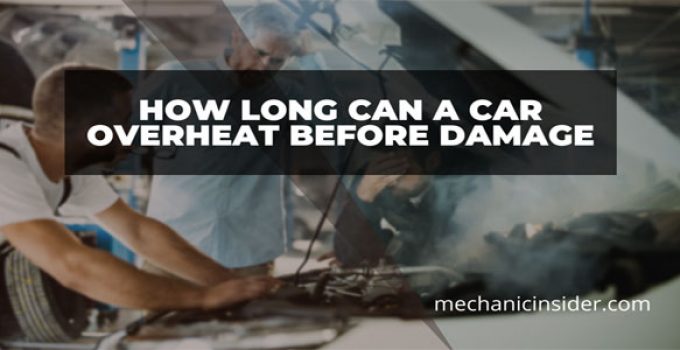Well, the answer is tricky. That is because there is no specific telling about it. But remember that overheating means extremely hot temperature rises in your engine. It can damage the engine by a lot of means if you do not take the necessary steps.
HOW LONG CAN A CAR OVERHEAT BEFORE DAMAGE?
Some cars may go 20 or 40 miles, and they would be in good condition. When someone runs out of luck, the car can shut down automatically after going one or two miles. Therefore, how long can a car overheat before damage?
If you want to find the answer, read the article thoroughly. To know the details, read through this article up to the bottom line. It will give you an idea to deal with the situation.
What is Overheating of an Engine?
It means your engine’s temperature exceeds its optimum level and begins to fail to perform as regular. But not always happens. Some cars can handle overheat in an outstanding amount of time, and some others cannot.
It would be wise to take measures rather than depending on the engine’s durability. If you wait to test the limits of an overheated engine, your engine’s life would be in danger.
Reasons of Overheating
There are many reasons behind the overheating of any engine. You might be thinking almost all cars have a cooling system.
Then why do cars overheat? The main reason behind this is the leakage. There must be some leaks in the coolant pipe or other flow pipes. It interrupts the cooling system, and the temperature cannot dissipate to the environment.
As the engine produces enormous energy to run the whole car, the engine’s heat needs to release.
Several coolants are capable of doing the job. But sometimes improper compounds hinder the task, and the engine gets overheated.
Radiators, water pumps, thermostats are the critical factors to the cooling system. Any malfunction of these factors will cause overheating issues.
Some Basics During Overheating
People always get confused about what to do when the car is overheated and panicked.
First of all, getting panic is not an option. Keep your calm and think about dealing with the situation. When you see any steams, pull over at that moment.
Even if your temperature gauge is not giving any red signs, pull over the car immediately. Then get to the engine hood and open it carefully.
Let the engine cool down at average temperature. But how long does it take for a car to cool down after overheating?
Well, it takes about 30 to 40 minutes to dissipate the high temperature by itself. Check the coolant level if they are empty or not. Sometimes adding some coolants can solve the problem immediately.
Want to Keep Going with Overheated Engine?
Most people do not care about overheating and drive until it shuts down on its own.
Suppose your car is overheating. Do you want to go some extra miles? That is not recommended. Well, you can go some extended miles.
But it will do more damage to your engine. That is because the machine will be more heated as it is using more power without proper cooling. Therefore, the engine damage will be significant than before.
Without proper heat insulation, the engine cannot give the utmost performance to the vehicle. On top of that, with more damage, the repair cost will be higher. Hence, it would be wise to enough until the engine is being cooled down. Do not drive with an overheated engine.
What can be the Risk?
When the engine is overheating for an extended period, several damages can take place. Let us show you the damages that might occur:
Cracked Engine Block
If excess heat is trapped in the engine, it can crack the engine’s blocks. These blocks are made of iron or steel materials. With a more excellent supply of heat, they can expand or bend easily.
It leads to leakages of blocks and further overheating issues. An engine block is pretty tough to fix. Sometimes a greater might destroy the whole engine, and it is needed to replace with a new one.
Cylinder and Pistons
When the engine is overheated, it might warp the cylinder head of the engine. It will play a vital role in overheating if the head is warped.
Mainly, they are made of aluminum, and it makes them more vulnerable to heat. The seals of the blocks will not work correctly because of it. It can also fail the head gasket if specific measures are not taken quickly.
Head Gasket
The head gasket remains on the head of the cylinder. If the engine is overheated, it will provide enough heat to the metal to expand.
Therefore, the head gasket will get cracked or lose. It will lead to water leaks into the cylinder. Then many other parts will be damaged. Sometimes the entire cylinder-head might need to replace.
Seals
Seals are pretty crucial to the valve of the engine. When they get enough heat, they started to dry out or meltdown. It leads to cracks in the seals as well as the valves.
If that happens, the performance of the engine will be compromised. Some of the oil residues will gather around the valve or on the spark plugs. It can also increase emissions.
Some Advice
The most important thing is that you do not drive an overheated car. You will not notice any damages in a single period. But a continuous act like this will damage your engine and reduce the lifetime. When you are in a situation of overheating, try heat insulation system or go to the nearest garage or maintenance shop. Regular maintenance can extend the lifetime and keep it healthy.
Conclusion
Are you worried about your car’s overheating issue, and how long can a car overheat before damage? We discussed overheating and its effects on the engine. We hope you found the answer to the question of how long a vehicle can overheat before taking any damage. Remember to take care of the vehicle for long-time performance.



